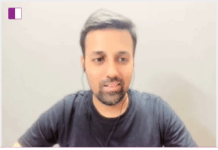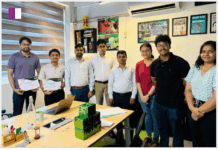Parsh Kothari is not just the Co-founder and CEO of Think School. His story is one that quietly reveals the backbone of entrepreneurship an unglamorous, relentless stretch of days and nights where roles blur, discomfort is constant, and resilience is forged in solitude. Parsh Kothari’s path to building Think School was anything but instant, and that slow, grinding climb offers a sharp reminder that conviction not convenience is the real foundation of any meaningful venture.
Parsh Kothari’s earliest days at Think School looked nothing like the structured, strategy-driven business many see today. Before the title of co-founder meant boardrooms and product strategies, Parsh Kothari wore hats that few would envy. He wasn’t just a leader; he was the admin, the compliance officer, the accounts manager, and the entire customer support team wrapped into one. His personal phone number wasn’t just a contact; it was the company’s helpline, and every student had access to it.
Parsh Kothari’s workdays bled into nights, often running on missed meals and zero marketing budgets. His vision was carried more on grit than on capital. Whether riding his bike under the brutal Pune summer, going from college to college in search of one “yes” to his workshop pitches, or standing for hours under the sun waiting to process stamp papers in court, Parsh Kothari embodied a simple truth nobody will believe in your idea until you have demonstrated, through action, that you believe in it first.
This early grind wasn’t unique to Parsh Kothari alone. His co-founder, Ganesh, was scripting and editing content from morning till night. But what stands out in Parsh Kothari’s reflection is the clarity with which he recognizes those struggles not as distractions, but as training grounds. These weren’t the hurdles on the path; they were the path. Fixing broken payment links at night and pitching a vision in the morning may not sound glamorous, but as Parsh Kothari shows, they are the necessary rites of passage before delegation and scaling can even be considered.
Parsh Kothari’s story dismantles the misconception that success is only about sharp suits, funding rounds, or flashy marketing campaigns. Think School’s foundation was manual, scrappy, and painfully slow. But it was authentic. And in that authenticity, Parsh Kothari and his team built something that eventually earned the right to operate with systems, teams, and scale.
Today, Parsh Kothari focuses on Strategy and Product. The shift from “doing everything” to refining core strengths is a milestone many founders aspire to reach. Yet, Parsh Kothari’s reflection emphasizes that this is not where you start it’s where you arrive after having done the dirty work that can’t be outsourced. In his own words, “You can’t outsource conviction.” This single statement distills the ethos with which Parsh Kothari navigated the zero-to-one phase of entrepreneurship.
For anyone currently knee-deep in a similar stage juggling operations, support, sales, and administration all at once Parsh Kothari offers something more valuable than motivational jargon: perspective. He doesn’t romanticize the grind, nor does he suggest that suffering is a badge of honor. Rather, Parsh Kothari highlights that these difficult phases shape an understanding of your product, your customers, and your business in a way that delegation alone cannot teach.
Even today, the symbolism of Parsh Kothari’s old bike maintained and preserved says more than most success stories told in metrics. Whenever he feels low, a simple ride reconnects him to those early days when Think School was nothing but a vision carried on two wheels and tireless conviction. It’s a grounded reminder that the journey is never purely upward or linear.
Parsh Kothari’s insights also subtly redefine what it means to “scale.” Scaling isn’t just about hiring people and building systems; it’s about first understanding every part of your business intimately enough that when the time comes to delegate, you do it with wisdom and clarity. That wisdom, Parsh Kothari implies, is earned in the trenches not in executive meetings.
For founders, freelancers, and builders of any kind, Parsh Kothari’s journey provides not shortcuts but reassurance. The seemingly scattered, exhausting tasks of today are not wasted effort; they are deposits into an account of expertise and conviction that will later allow you to step back, delegate, and scale with confidence. Parsh Kothari stands as a case study in the value of patience, self-reliance, and doing the unscalable work that eventually makes scale possible.
In the landscape of entrepreneurial narratives, where overnight success is often glorified and struggle sanitized, Parsh Kothari’s voice adds a refreshing, honest counterpoint. His career trajectory, grounded in hard-won lessons and unspectacular labor, reminds us that success doesn’t sprout from shortcuts or comfort zones. It is nurtured in the early, invisible efforts where only the builder knows how much has been risked, how many tasks have been juggled, and how much of themselves they’ve poured into their idea.
Ultimately, Parsh Kothari’s journey isn’t just about Think School. It’s about the mindset every builder needs: do the work first, understand every corner of what you’re creating, and only then, gradually, earn the privilege to delegate and scale. And when the weight feels heavy, maybe do as Parsh Kothari does get back on the bike, remember where it started, and remind yourself why it’s worth continuing.




































